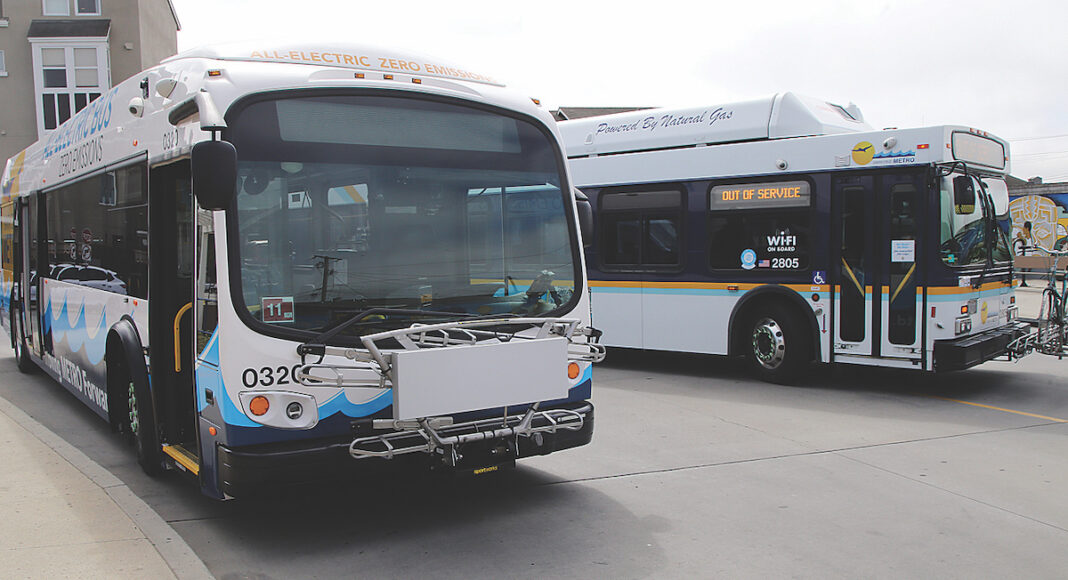WATSONVILLE—Santa Cruz METRO has taken a big step in combating greenhouse gas (GHG) emissions with the launch of two new electric buses, which will operate on a new route through the city of Watsonville.
On Tuesday METRO staff, along with city officials, representatives from electric vehicle technology manufacturer Proterra and other community members gathered at the Watsonville Transit Center to celebrate the unveiling of the new buses.
METRO CEO Alex Clifford said that the introduction of the fleet has been years in the making. In 2018, the agency received funding for four e-buses for the county—two of which would be used in Watsonville.
But as the deal was being made, a new generation of Proterra buses was unveiled. The new vehicle had a much more efficient charging time, with the capability of traveling between 205 and 329 miles per charge.
“Our aspiration is to always have as long a range as possible,” Clifford said. “Once we pull out that bus in the morning, we want it to run all day. So this was a blessing.”
Since 2002, METRO has been ahead of the curve with adopting sustainable bus fleets. This began with moving to buses that use compressed natural gas, followed by hybrid vehicles. The agency was awarded a federal grant in 2015 for its first three electric buses, which are now in use on the Highway 17 Express service.
In 2017, the agency adopted a goal of achieving a fully zero-emissions fleet by 2040—one full year before the state mandated the same.
“The buses provide an opportunity for METRO to further explore the use of zero-emission vehicles,” said Donna Lind, a member of the METRO board who also serves on the Scotts Valley City Council. “The project will contribute to sustainable transportation, reducing miles traveled, GHG emissions and congestion.”
Lind thanked the Regional Transportation Commission, CalTrans, the California Air Resources Board, METRO’s grant team, her fellow board members and other local and state partners for securing funding for the project.
Proterra’s Regional Sales Director Mark Hollenback called the moment a “historic day” for Santa Cruz County. The company, which designs, engineers and manufactures entirely in the United States, is headquartered just over the hill in Burlingame.
“It’s great to be here, in our home turf in Northern California, to help Santa Cruz and the city of Watsonville mark the deployment of your new buses,” he said.
Hollenback alluded to the importance of green technology, and counties like Santa Cruz that are taking action to utilize it. Every time a Proterra e-bus replaces an e-bus, he said, about 230,000 pounds of carbon pollution are avoided each year.
“We’ve witnessed, just in the past few weeks, the growing signs of climate change,” he said. “The importance of zero-emissions transportation has never been clearer.”
Watsonville Mayor Jimmy Dutra has been a member of METRO’s board since 2014. He and others lobbied for years, locally, statewide and to the federal government to procure the buses and the infrastructure for them.
“We told the stories of Watsonville … from our farmworkers, who depend on this as their only mode of transportation,” he said. “To our seniors using this to go to their doctor’s appointments and get their medication. Or our students, who use this to go to Cabrillo and UCSC … The only way they can get an education is to use this bus system.”
The buses will run on a new route known as the circulator, which will connect the Watsonville transit center with primary retail and medical destinations within the city, both clockwise and counter-clockwise. It will roll along Main and Lincoln streets, Green Valley Road and Freedom Boulevard, connecting commuters with other bus routes.
Clifford called the new route “very unique,” referring to how it runs both clockwise and counter-clockwise.
“We don’t do anything like this anywhere else in the system,” he said. “It’s very new for us. We’re so excited to start the circulator.”
The service begins Sept. 16 and will run seven days a week with 16 daily round trips. For the first year of operation, rides on the circulator will be free of charge. This, said Clifford, is to encourage as many people as possible to use it.
“We’re hoping to build ridership fast, and keep it going,” he said.
Added Dutra: “We envision this route becoming a critical link for our community.”
For information about the circulator route, visit scmtd.com.














